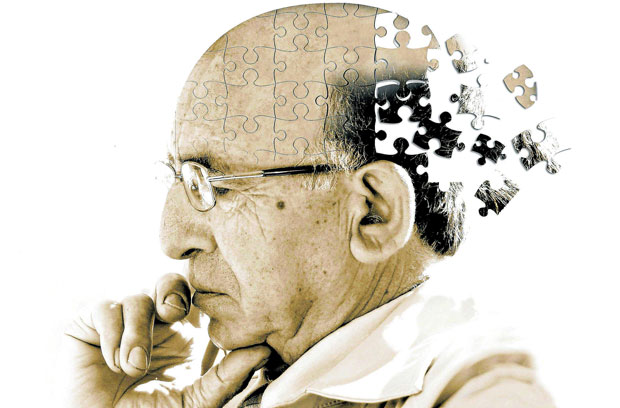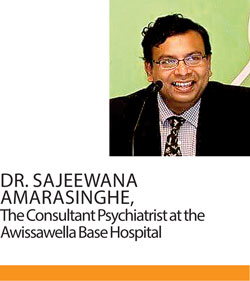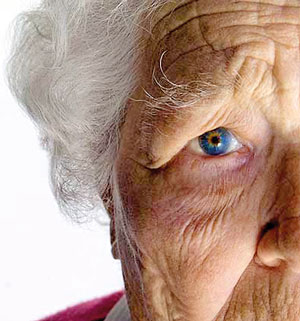28 Aug 2017 - {{hitsCtrl.values.hits}}

 ‘Isn’t it heart breaking to see your mother getting entrapped in the shadow of forgetfullness, little by little? It’s frustrating when you feel that there’s nothing you can do about it. Often she can’t remember who you are. She doesn’t even know who she is and why she is living in your home with the rest of the family members, who might now be total strangers for her. Today our Q & A session on this timely topic, Dementia, is with Dr. Sajeewana Amarasinghe, the consultant psychiatrist at the Awissawella Base Hospital. Amarasinghe said that early identification of dementia is important as treatment can help delay its progression. “Unfortunately in many the disease remains undetected until it becomes very advanced,” Dr. Amarasinghe said.
‘Isn’t it heart breaking to see your mother getting entrapped in the shadow of forgetfullness, little by little? It’s frustrating when you feel that there’s nothing you can do about it. Often she can’t remember who you are. She doesn’t even know who she is and why she is living in your home with the rest of the family members, who might now be total strangers for her. Today our Q & A session on this timely topic, Dementia, is with Dr. Sajeewana Amarasinghe, the consultant psychiatrist at the Awissawella Base Hospital. Amarasinghe said that early identification of dementia is important as treatment can help delay its progression. “Unfortunately in many the disease remains undetected until it becomes very advanced,” Dr. Amarasinghe said.
Definition 
Dementia causes gradual atrophy of the brain cells. This condition results in impaired memory, language and thinking ability and the patient won’t be able attend to daily activities. As the disease progresses there will be personality and behavioural changes. Dementia isn’t normal ageing. We all know that there will be some impairment of memory as people reach an advanced age. But dementia is much worse and is gradually progressive.
Around 5-7% of the world’s population over 60 years of age are affected by this condition.
The increased life expectancy and reduced birth rates have resulted in a proportionate increase in the elderly population. This has made dementia an increasingly important public health issue.
The types
Alzheimer’s disease is the commonest type of dementia. It causes a gradually worsening of memory loss.
There are two main types.
1. The pre-senile (early onset) type occurs in patients under the age of 65 and is mainly caused by genetic factors.
2. The senile type (late onset) occurs in the over 65 age group.
Vascular Dementia is due to multiple cerebral infarctions. It occurs in an older age group (late sixties and seventies) and the symptoms progress in a step-wise manner. The main risk factors for vascular dementia are obesity, high cholesterol levels, smoking and hypertension.
There are other less common types of dementia like Lewy body dementia, Fronto Temporal Dementia, Parkinson’s disease and HIV.
According to Dr. Amarasinghe, most types of dementia aren’t curable and treatment can only slow down the progress of the illness. But there are some rare types of dementia that can be cured. Therefore it’s important that every patient undergoes the initial investigations to find out the underlying cause of the disease.
How to identify a patient?
0aspect when it comes to Dementia” Dr. Amarasinghe stated. One needs to be vigilant and identify patients in the initial stage when the only symptom is lack of memory regarding recent events.For an example, they will fail to recall where they kept the car keys or wallet. They will keep forgetting dates and appointments. They may ask the same question repeatedly because they forget the answer.

According to Dr. Amarasinghe, these early features of Dementia may go unnoticed as family members may consider it a part of normal ageing. This is specially because long-term memory remains intact at this early stage and the patient may quite easily recall his or her younger days.
Untreated Dementia slowly progresses into a stage where the patients long-term memory as well as language and reasoning powers become impaired. They may develop personality as well as behavioural changes. Unfortunately many people seek medical attention only at this stage.
Gradually progressing memory loss
They may get lost in familiar surroundings. They may forget that they have taken their meals and repeatedly ask for food.This leads to the inability of recognizing close associates, including family members. They may even forget their personal information. Eventually they may even neglect their personal hygiene and will need full time care.
Language difficulties
Patients may have difficulties in naming objects. They also find it difficult to find the right words when speaking. They may start making uncharacteristic writing and spelling errors.
Cognitive functions
Patients will lose their ability to plan and organize things. They have poor judgment and may not be able to make rational decisions.They have poor understanding of safety.
Visuospatial impairment
Initially they may not be able to find their way in unfamiliar surroundings but later on they may even get lost in familiar neighbourhoods.
They will also develop difficulties in doing familiar tasks like dressing and cooking.
Personality and behavioural changes
Patients may develop changes in their personality. Generally there will be an exaggeration in existing personality traits.
They may become suspicious and wrongly believe that family members are stealing their belongings. This may lead to arguments and fights.
They may also start hearing voices or seeing things that don’t exist. This phenomenon is called hallucinations. This might make them angry and agitated.
Their moods might fluctuate frequently. Some may become depressed while others may be predominantly irritable or anxious.
In severe dementia patients may develop socially inappropriate behaviors like passing urine in public. This will make the carers’ tasks more difficult.
Confirmation
Cognitive testing can be done to confirm dementia.
“They are also useful in tracking the progression of the illness. In addition certain tests may be needed to find out the cause of dementia. This includes blood tests as well as brain imaging,” explained Dr. Amarasinghe
Do other illnesses share similarities?
Yes. A predominant feature in elderly people is memory loss. Depression is a disorder characterized by symptoms like persistent low mood, lack of interest and lack of pleasure. This is very much a treatable illness.
This is another reason that one should seek early medical attention. The memory loss will disappear when the depression is treated.
Treatment
Unfortunately, there is no cure for most forms of Dementia. This includes the commonest types like Alzheimer’s Dementia and Vascular Dementia.But there are medications that help to slow down the progression of the disease.
Managing the patient
These symptoms are a huge challenge and cause a great deal of stress to the family
and carers.
There are medications as well as psychological and behavioral therapies that help. Some therapies help to reduce mood fluctuations. While others help to cope with with memory loss. Stimulating therapies like music and art are helpful.
Help
“We should help patients to live an independent life as much as possible while minimizing risks. Care givers need to ensure that patients have a good balanced diet and help them maintain
personal hygiene.
Some form of exercise as well as social interaction is very helpful. The family can help a patient by reminiscing about the past. Photographs are helpful in this regard. Many find it relaxing as they are more comfortable talking about the past. This is because those memories are intact until the dementia becomes advanced,”said Dr. Amarasinghe.
Minimizing risk
“You may need to make some modifications to the home. Installing hand rails on the walls and improving lighting will help prevent falls. Supervision plus the use of electric equipment may be needed to avoid accidents. The doors can be locked to prevent the patient from wandering about and getting lost. Memory aids like displaying emergency telephone numbers will be helpful to the patient,”he said.
Prevention
Keeping active both physically and mentally is essential. It is also important to maintain a healthy balanced diet which can help prevent the onset of dementia.
Preparing for the future
“Patients with dementia may deteriorate to a level where they can no longer attend to their financial transactions or write a will. Therefore it is wise to take early legal measures like completing their wills, opening joint bank accounts and giving the power of attorney to a trusted person,” concluded
Dr. Amarasinghe.
23 Dec 2024 2 hours ago
23 Dec 2024 3 hours ago
23 Dec 2024 6 hours ago
23 Dec 2024 7 hours ago